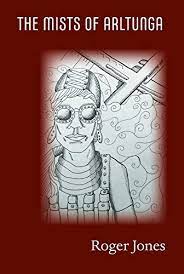
Two years ago, my good friend from Berea, Kentucky, Roger Jones published a thought-provoking extended parable about the current human condition shaped by post-modern capitalism. It’s a wonderfully insightful and artistically composed novel called The Mists of Arltunga. I highly recommend it.
Set In a mining camp (Arltunga) in central Australia 100 years ago, the story presciently portrays a world so polluted by chemical industries that the companies in question mine the foul-smelling air itself. They do so with glider air ships that draw behind them fine nets to capture jelly-like discharges from the open-pit mines below.
Of course, the putrid mists are also ingested by the mine workers whose nostrils and lungs end up hosting the foul emissions. They suffer and die accordingly.
But none of this matters to the chemical company’s absentee owner, nor to the mine overseer. The overriding concern of both is meeting production goals. To achieve those ends, the overseer browbeats his workers, alternatively threatens and sweet-talks them, punishes their shortcomings, and offers meaningless incentives. Worse still, he proves willing to kill troublemakers directly by using his pistol and covertly by provoking a fatal landslide by means of dynamite. He colludes with a competitor for purposes of controlling the workforces of both companies and of mutually enriching themselves.
In short, The Mists of Arltunga presents its mesmerized readers with a tale of unfettered capitalism that is both cautionary and actual.
But of course, (as in the real world) the most rebellious among the story’s exploited mineworkers take none of this lying down. Though they find themselves caught in a web of exploitation, they cannot initially free themselves. They’re impotent because employment in the mine represents their only source of sustenance without which they’d starve to death. Though the mine’s glider pilots can soar above it all for hours each day, they must eventually return to earth to eat the camp’s miserable gruel, turnips and thin soup. Eagles by day (an important metaphor in the book), they’re reduced to precariat slaves when they return to earth.
All of this holds true till one day a zeppelin from Perth crash lands with a deafening explosion and searing ball of flame near the mine site. All the vessel’s crew and passengers perish, except for the burnt and wounded daughter of Arltunga’s absentee owner. She’s saved by one of the mine’s glider-pilots who works in Arltunga alongside his father and younger brother. Unaware of the “sheila’s” true identity, both brothers immediately fall in love with her.
The girl, however, maintains a friendly but aloof distance from the pair. Under threat from the mine overseer, she is forced to conceal her true identity. She blends into the working community proving herself to be invaluable as a gardener and infirmary caregiver. Most surprisingly of all, she reveals herself as a competent glider pilot capable of flying with the best of the men.
A turning point comes when the camp overseer’s collusions with a competing mine operation come to light. It all involves the earlier-mentioned landslide, the resulting near-death experience of the mine owner’s daughter, and her abduction according to the plan of Arltunga’s mine overseer – again, the only character aware of the girl’s real name.
All of this catalyzes worker rebellion led by the story’s love-struck brothers. The climax involves a thrilling glider chase, another crash landing, and a surprising disclosure of hidden identities.
In the end, the revelations concluding The Mists of Arltunga point towards a mythic, parable-like and robust affirmation of the unity of the entire human family. They offer hope that acknowledgment of that single household can unite bosses and workers even altering the behavior of greedy absentee proprietors.
Do yourself a favor. Read Roger Jones’ splendid, hopeful and critical parable. Be inspired accordingly.